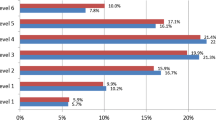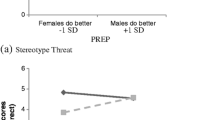Abstract
Since 2000, surveys on academic achievement show gender inequalities in favor of girls in the school setting. The aim of the present study was to examine if gender stereotypes about academic abilities that are usually considered as fully demonstrated in the literature have to be updated. Three hundred ninety-eight French fifth graders from a medium-sized provincial town answered a questionnaire designed to examine, both with direct and indirect measures, if they hold different gender stereotypes concerning mathematics and reading depending on target’s age (children vs. adults). As expected, results showed that participants, regardless of their gender, were aware of a math-ability stereotype favorable to men when the stereotyped targets were adults. When the stereotyped targets were children and young adolescents, the math-ability stereotype was less clear. Participants believed that people think that girls succeed as well as boys in math. Concerning reading-ability, participants reported the “usual” stereotype favorable to females, regardless of the stereotyped target’s age (child or adult). Together these results suggest that academic gender stereotypes have to be reconsidered. The math-ability stereotype targeting children and favorable to both genders seems to show an improvement of the French girls’ reputation in mathematics. Moreover, the reputation of French boys in this domain seems to be poorer than reported in previous research.
Similar content being viewed by others
References
Ambady, N., Shih, M., Kim, A., & Pittinsky, T. L. (2001). Stereotype susceptibility in children: Effects of identity activation on quantitative performance. Psychological Science, 12, 385–390. doi:10.1111/1467-9280.00371.
Andre, T., Whigham, M., Hendrickson, A., & Chambers, S. (1999). Competency beliefs, positive affect, and gender stereotypes of elementary students and their parents about science versus other school subjects. Journal of Research in Science Teaching, 36, 719–747. doi:10.1002/(SICI)1098-2736(199908.
Bouchard, P., St-Amant, J. C., Bouchard, N., & Tondreau, J. (1996). Modèles de sexe et rapports à l'école: guide d'intervention auprès des élèves de troisième secondaire. [Gender models and links to school: a guide to intervene with ninth-grade students.] Montréal: Les Éditions du Remue-ménage.
Brown, R. P., & Josephs, R. A. (1999). A burden of proof: Stereotype relevance and gender differences in math performance. Journal of Personality and Social Psychology, 76, 246–257. doi:10.1037/0022-3514.76.2.246.
Brown, R., & Pinel, E. (2003). Stigma on my mind: Individual differences in the experience of stereotype threat. Journal of Experimental Social Psychology, 39, 626–633. doi:10.1016/S0022-1031(03)00039-8.
Ceci, S. J., & Williams, W. M. (2011). Understanding current causes of women’s underrepresentation in science. Proceedings of the National Academy of Sciences, 108, 3157–3162. doi:10.1073/pnas.1014871108.
Ceci, S. J., Williams, W. M., & Barnett, S. M. (2009). Women’s underrepresentation in science: Sociocultural and biological considerations. Psychological Bulletin, 135, 218–261. doi:10.1037/a0014412.
Chatard, A., Guimond, S., & Selimbegovic, L. (2007). “How good are you in math?” The effect of gender stereotypes on students’ recollection of their school marks. Journal of Experimental Social Psychology, 43, 1017–1024. doi:10.1016/j.jesp.2006.10.024.
Davies, P. G., Spencer, S. J., Quinn, D. M., & Gerhardstein, R. (2002). Consuming images: How television commercials that elicit stereotype threat can restrain women academically and professionally. Personality and Social Psychology Bulletin, 28, 1615–1628. doi:10.1177/014616702237644.
Deaux, K. (1985). Sex and gender. Annual Review of Psychology, 36, 49–81. doi:10.1146/annurev.ps.36.020185.000405.
Degenne, A. & Giret, J.F. (2004). Genre et données longitudinales. [Gender and longitudinal data.] Cereq, Relief, 4.
Désert, M., Préaux, M., & Jund, R. (2009). So young and already victims of stereotype threat: Socio-economic status and performance of 6 to 9 years old children on Raven’s progressive matrices. European Journal of Psychology of Education, 24, 207–218. doi:10.1007/BF03173012.
Else-Quest, N. M., Hyde, J. S., & Linn, M. C. (2010). Cross-national patterns of gender differences in mathematics: A meta-analysis. Psychological Bulletin, 136, 103–127. doi:10.1037/a0018053.
EURYDICE. (2010). Différences entre les genres en matière de réussite scolaire: étude sur les mesures prises et la situation actuelle en Europe [Gender differences in academic achievement: A study on the measures that have been taken and the current situation in Europe], Réseau Eurydice. Retrieved from http://eacea.ec.europa.eu/education/eurydice/index_fr.php
Fize, M. (2003). Les pièges de la mixité scolaire [Pitfalls of coeducation]. Paris: Presses de la Renaissance.
Guimond, S., & Roussel, L. (2001). Bragging about one’s school grades: Gender stereotyping and students’ perception of their abilities in science, mathematics and language. Social Psychology of Education, 4, 275–293. doi:10.1023/A:1011332704215.
Hargreaves, M., Homer, M., & Swinnerton, B. (2008). Comparison of performance and attitudes in mathematics amongst the “gifted”. Are boys better at mathematics or do they just think they are? Assessment in Education: Principles, Policy & Practice, 15, 19–38. doi:10.1080/09695940701876037.
Huguet, P., & Régner, I. (2007). Stereotype threat among schoolgirls in quasi-ordinary classroom circumstances. Journal of Educational Psychology, 99, 545–560. doi:10.1037/0022-0663.99.3.545.
Hyde, J. S., & Linn, M. C. (1988). Gender differences in verbal ability: A meta-analysis. Psychological Bulletin, 104, 53–69. doi:10.1037/0033-2909.104.1.53.
Hyde, J. S., Lindberg, S. M., Linn, M. C., Ellis, A., & Williams, C. (2008). Gender similarities characterize math performance. Science, 321, 494–495. doi:10.1126/science.1160364.
Jost, J. T., & Banaji, M. R. (1994). The role of stereotyping in system-justification and the production of false consciousness. British Journal of Social Psychology, 33, 1–27.
Jost, J. T., & Kay, A. C. (2005). Exposure to benevolent sexism and complementary gender stereotypes: Consequences for specific and diffuse forms of system justification. Journal of Personality and Social Psychology, 88, 498–509. doi:10.1037/0022-3514.88.3.498.
Jost, J. T., Banaji, M. R., & Nosek, B. A. (2004). A decade of system justification theory: Accumulated evidence of conscious and unconscious bolstering of the status quo. Political Psychology, 25, 881–919. doi:10.1111/j.1467-9221.2004.00402.x.
Keller, C. (2001). Effect of teachers’ stereotyping on students’ stereotyping of mathematics as a male domain. The Journal of Social Psychology, 141, 165–173. doi:10.1080/00224540109600544.
Keller, J., & Dauenheimer, D. (2003). Stereotype threat in the classroom: Dejection mediates the disrupting threat effect on women’s math performance. Personality and Social Psychology Bulletin, 29, 371–381. doi:10.1177/0146167202250218.
Keller, J. (2002). Blatant stereotype threat and women’s math performance: Self-handicapping as a strategic means to cope with obtrusive negative performance expectations. Sex Roles, 47, 193–198. doi:10.1023/A:1021003307511.
Kiefer, A., & Shih, M. (2006). Gender differences in persistence and attributions in stereotype relevant contexts. Sex Roles, 54, 859–868. doi:10.1007/s11199-006-9051-x.
Kurtz-Costes, B., Rowley, S. J., Harris-Britt, A., & Woods, T. A. (2008). Gender stereotypes about mathematics and science and self-perceptions of ability in late childhood and early adolescence. Merrill-Palmer Quarterly, 54, 386–409. doi:10.1353/mpq.0.0001.
Maccoby, E. E. (1990). Gender and relationships: A developmental account. American Psychologist, 45, 513–520. doi:10.1037/0003-066X.45.4.513.
Maccoby, E. E., & Jacklin, C. N. (1987). Gender segregation in childhood. In H. W. Reese (Ed.), Advances in child development and behavior (Vol. 20, pp. 239–288). New York: Academic Press.
Martinot, D., & Désert, M. (2007). Awareness of gender stereotype, personal beliefs and self-perceptions regarding math ability: When boys do not surpass girls. Social Psychology of Education, 10, 455–471. doi:10.1007/s11218-007-9028-9.
Muzzati, B., & Agnoli, F. (2007). Gender and mathematics: Attitudes and stereotype threat susceptibility in Italian children. Developmental Psychology, 43, 747–759. doi:10.1037/0012-1649.43.3.747.
PISA Programme for International Student Assessment. (2006 and 2009). Retrieved from http://www.pisa.oecd.org
Pomerantz, E. M., Altermatt, E. R., & Saxon, J. L. (2002). Making the grade but feeling distressed: Gender differences in academic performance and internal distress. Journal of Educational Psychology, 94, 396–404. doi:10.1037/0022-0663.94.2.396.
Räty, H., & Kasanen, K. (2007). Gendered views of ability in parents’ perceptions of their children’s academic competencies. Sex Roles, 56, 117–124. doi:10.1007/s11199-006-9153-5.
Räty, H., Vänskä, J., Kasanen, K., & Kärkkäinen, R. (2002). Parent’s explanations of their child’s performance in mathematics and reading: A replication and extension of Yee and Eccles. Sex roles, 46, 121–128. doi:10.1023/A:1016573627828.
Rosenwald, F. (2006). Filles et garçons dans le système éducatif depuis vingt ans [Girls and boys in the educational system for the last twenty years]. Données Sociales-La société française, Insee, 87–94.
Schmader, T., & Johns, M. (2003). Converging evidence that stereotype threat reduces working memory capacity. Journal of Personality and Social Psychology, 85, 440–452. doi:10.1037/0022-3514.85.3.440.
Schmader, T., Johns, M., & Barquissau, M. (2004). The costs of accepting gender differences: The role of stereotype endorsement in women’s experience in the math domain. Sex Roles, 50, 835–850. doi:10.1023/B:SERS.0000029101.74557.a0.
Smith, J. L., & Johnson, C. S. (2006). A stereotype boost or choking under pressure? Positive gender stereotypes and men who are low in domain identification. Basic and Applied Social Psychology, 28, 51–63. doi:10.1207/s15324834basp2801_5.
Sommers, C. H. (The war against boys). Atlantic Monthly, 285, 59–70.
Spencer, S., Steele, C. M., & Quinn, D. M. (1999). Stereotype threat and women’s math performance. Journal of Experimental Social Psychology, 35, 4–28. doi:10.1006/jesp.1998.1373.
Steele, J. (2003). Children’s gender stereotypes about math: The role of stereotype stratification. Journal of Applied Social Psychology, 33, 2587–2606. doi:10.1111/j.1559-1816.2003.tb02782.x.
Swim, J. K. (1994). Perceived versus meta-analytic effect sizes: An assessment of the accuracy of gender stereotypes. Journal of Personality and Social Psychology, 66, 21–36. doi:10.1037/0022-3514.66.1.21.
Walsh, M., Hickey, C., & Duffy, J. (1999). Influence of item content and stereotype situation on gender differences in mathematical problem solving. Sex Roles, 41, 219–240. doi:10.1023/A:1018854212358.
Yee, M., & Brown, R. (1994). The development of gender diffenrentiation in young children. British Journal of Social Psychology, 33, 183–196.
Author information
Authors and Affiliations
Corresponding author
Rights and permissions
About this article
Cite this article
Martinot, D., Bagès, C. & Désert, M. French Children’s Awareness of Gender Stereotypes About Mathematics and Reading: When Girls Improve Their Reputation in Math. Sex Roles 66, 210–219 (2012). https://doi.org/10.1007/s11199-011-0032-3
Published:
Issue Date:
DOI: https://doi.org/10.1007/s11199-011-0032-3




